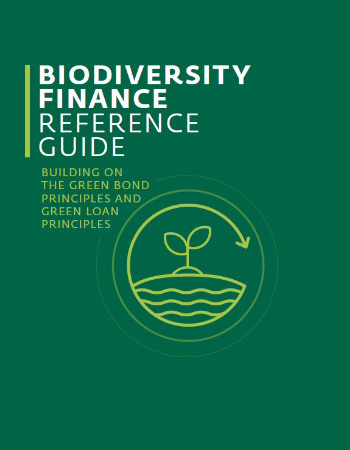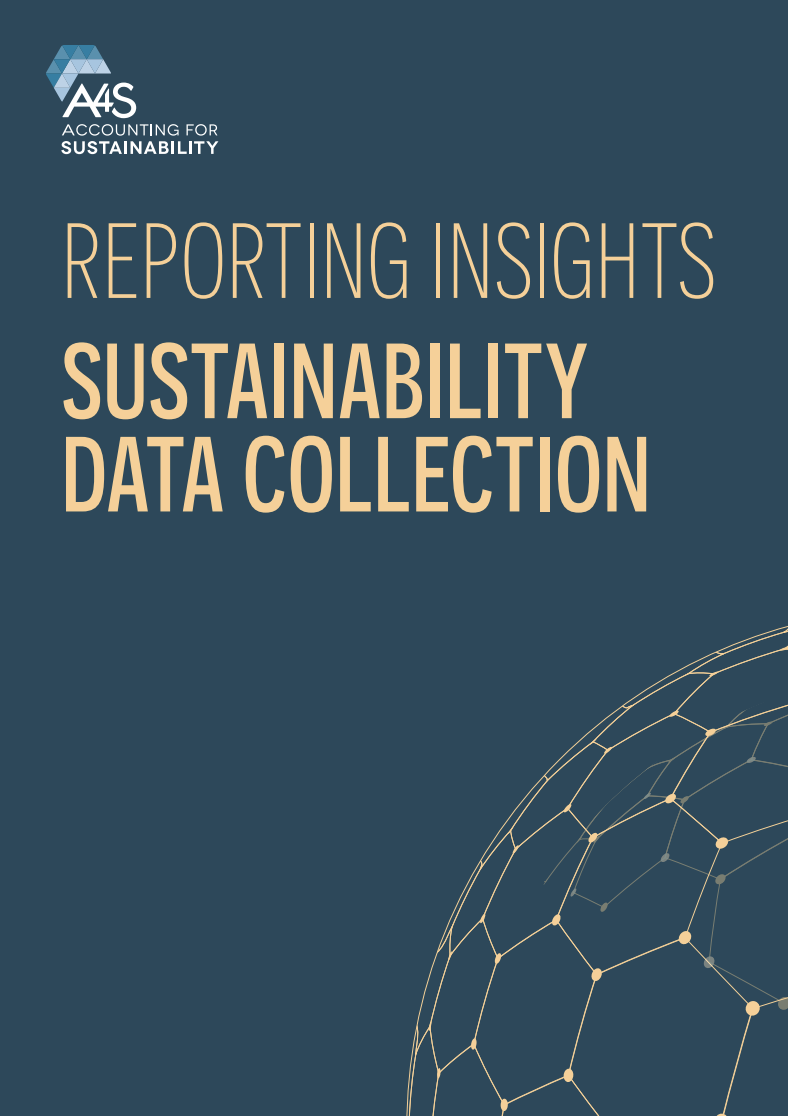Finance
Description
These resources will help you to embed sustainability into your company’s processes for raising and allocating capital, such as aligning values with investment sources, investor relations, business planning, and budgeting.
Share this Practice on:LinkedIn
Resources
Integrating Sustainability Across Operations
Principles of Integrated Capitals Assessments
This guide from the Capitals Coalition can help you make more holistic capitals assessments by accounting for natural, human, and social capital. It is designed to promote more consistency in how capital assessments are conducted. The first section outlines the spectrum capitals assessments, from ‘single capital assessments’ to ‘multi-capital assessments’ through to ‘integrated capitals assessments. The second section provides a five-principle framework designed to support the use of integrated capitals assessments. This guide will be most useful to sustainability and finance departments.
Integrated Decision-Making Framework
Often, direct financial impacts are prioritised in decision-making, while other impacts, such as those related to nature and society, are not considered to the same extent, despite being equally real and tangible. The Integrated Decision-Making Framework provides a roadmap for considering and navigating the landscape of our planet's intersecting natural, social, human, and produced capital, and for embedding the values of these four capitals into all decision-making.
The Integrated Decision-Making Framework provides a practical approach for an integrated capitals assessment with a clear governance structure. It features detailed technical guidance for practitioners, and is aimed to support them in preparing capitals information for decision-making. Currently, the Framework is comprised of three key resources: the Capitals Protocol, Governance for Valuation, and A Primer on Integrated Decision-Making. To help you value four capitals systemically into decisions, the Capitals Protocol provides seven iterative steps for integrated decision-making. These steps form the backbone of an integrated capitals assessment, and are organised in three stages: Assemble, Assess, and Act. Governance for Valuation increases transparency and consistency in valuation, building on four blocks to drive confidence in decision-making: transparency requirements, confidence criteria, value notes, and attribution scopes. Additionally, the Primer on Integrated Decision-Making offers a high-level introduction to the purpose, structure, and available technical guidance that the Integrated Decision-Making Framework provides.
A4S Essential Guide: Strategic Planning, Budgeting, and Forecasting
In a changing world where the long-term economic, social, and environmental outlook is tremendously complex and uncertain, it has become increasingly difficult to respond to emergent trends. This guide from A4S was designed to improve decision-making and risk management by providing finance teams with tools, practical examples, and guidance on how to integrate sustainability into strategic planning, budgeting, and forecasting.
A4S Essential Guide to Valuations and Climate Change
Understanding and assessing climate change impacts is critical to determining the value of businesses and making sound investment decisions. This guide from A4S features a five-step framework to help investors and valuators incorporate climate change risks and opportunities into valuations, and includes case studies and practical advice on performing valuation analysis.
Win-Win-Win: The Sustainable Supply Chain Finance Opportunity
This report from BSR highlights mechanisms - such as sustainable trade loans and smart contract solutions - that will help you to leverage supply chain finance to incentivize and scale sustainable behaviour among your suppliers.
Financial innovation for SME net zero transition: Role of banks and buyers
This report from University of Cambridge Institute for Sustainability Leadership (CISL) and BSR explains how you can decarbonise your value chain by supporting small and medium-sized enterprises (SMEs). It covers four potential solutions to the common barriers SMEs face in reaching net zero, including a diagnostic tool to assess SME climate readiness; a shared repository for SME sustainability data; SME decarbonisation roadmaps; and a net zero support services marketplace. This guidance will be most useful to external facing teams, including procurement and supply chain management, as well as your sustainability team.
How to Talk to Your CFO About Sustainability
This article explains how to use the five-step Return on Sustainability Investment (ROSI) method to help CFOs make the connection between financial performance and sustainability. This resource will especially benefit change agents who are trying to show how proposed sustainability acitivities will meet ROI imperatives.
Broadening the horizon: How CFOs and Finance Functions can help drive corporate sustainability
This guide from the University of Cambridge Institute for Sustainability Leadership (CISL) can help you understand how finance teams can adapt and develop to fill their essential role in corporate sustainability transformation. It outlines the growing expectations for businesses to shift their focus from delivering financial performance for shareholders to delivering long-term wellbeing for people and the planet; explains the implications of this shift for businesses (and, specifically, for the corporate finance function); and highlights key enablers of transformation that will support finance functions in adapting to this changing environment. These insights will be most useful to CFOs and finance professionals.
Advancing the S in ESG: A primer for CFOs
This primer from WBCSD, in partnership with Shift Project and the CFO Network, is designed to introduce CFOs to social sustainability and why it is essential to their role. Part one provides overview of the what, who, and how of corporate social performance, and part two shares key insights from CFOs on how to better measure social performance.
Sustainable Finance Primer Series
This series of primers from the Institute for Sustainable Finance offers succinct introductions to common sustainable finance topics and tools. They cover over 20, including transition bonds, climate risk, and financed emissions. Each primer provides a breakdown of the topic definition, its importance, and its challenges, and while the primers give special attention to the Canadian context, the insights offered are broadly applicable. This resource will be most useful to finance teams and others seeking to orient themselves to the financial sustainability landscape.
Biodiversity Finance Reference Guide
The IFC has developed this guide to help you to better understand project eligibility criteria for biodiversity finance, as well as some of the more common project types. The guide builds on the Green Bond Principles and the Green Loan Principles and highlights different types of investment projects, activities, and components that help protect, maintain, or enhance biodiversity and ecosystem services, as well as promote the sustainable management of natural resources. This is a good resource for identifying opportunities to address the key drivers of biodiversity loss in your production practices; to integrate nature-based solutions into their operations; and to develop nature conservation activities.
Reporting Insights: Sustainability Data Collection
This brief from Accounting for Sustainability (A4S) can help you to better obtain timely, complete, and accurate sustainability data. It identifies key questions and key elements that can help you to ensure robust sustainability data collection, and provides detailed information and practical actions for finance teams on four essential data-related "areas": information quality and control environment, technology and automation, data sources, and assurance.
Investing to Support Change
The TPI Tool
Created by the Transition Pathway Initiative, the TPI tool can help you to assess the alignment of your investments with the goals of the Paris Agreement. This corporate climate action benchmark assesses how prepared companies are for the transition to a low-carbon economy. Using publicly disclosed company information, the TPI tool evaluates and tracks companies based on two dimensions: the quality of companies’ management of their greenhouse gas emissions and of risks and opportunities related to the low-carbon transition, and how companies’ planned or expected future carbon performance compares to international targets and national pledges made as part of the Paris Agreement.
The Transition Pathway Initiative also publishes discussion papers, explainers, reports, and carbon performance assessments for numerous sectors and industries, among other resources.
Net Zero Investment Framework: Implementation Guidance for Objectives and Targets
The Net Zero Investment Framework provides a common set of recommended actions, metrics, and methodologies that can help investors to define strategies, measure alignment, and transition portfolios in ways that support net zero emissions future. Developed by the Institutional Investors Group on Climate Change (IIGCC), this is a good resource for investors and asset owners that want to decarbonise their investment portfolios and increase investment in climate solutions in ways that are consistent with the 1.5°C temperature goal of the Paris Agreement.
The IIGCC has also developed supplemental guidance on target-setting, investor expectations of corporate transition plans, recommendations for specific asset classes, and more.
Return on Sustainability Investment (ROSI) Methodology
Although business and societal success depends on sustainability, most businesses companies struggle with demonstrating the monetary impact of their sustainability efforts as they seek to address ESG issues. In response, the NYU Stern Center for Sustainable Business (CSB) has developed the Return on Sustainability Investment (ROSI) methodology. The ROSI methodology was created to help companies measure the financial returns on their sustainability activities and, thus bridging the gap between sustainability strategies and financial performance and allowing users to build a better business case for current and future sustainability initiatives.
CSB offers in-depth resources on ROSI, including a step-by-step overview; original research publications and an interactive research database; industry case studies on implementing ROSI; Excel tools for testing ROSI focused on risk, talent, and operational efficiency; and a free online course module for building a case for sustainability.
This suite of resources will help you to assess the value created by sustainability strategies, to track sustainability-related financial performance in real time, and to assess the potential ROI of future sustainability initiatives at both the firm and the division level.
Investment Patterns and Leverage
This brief from Re:Structure Lab can help you to better understand how investment patterns can be better prioritised and leveraged to combat forced labour and other pervasive forms of social inequity. It explains how changing patterns of investment are creating structural constraints on labour costs and are directly and indirectly driving the use of forced labour, and it provides recommendations for correcting these trends. It also identifies meaningful action investors can take to promote decent work.
The Net Zero Investment Framework 2.0
This updated framework from the Institutional Investors Group on Climate Change (IIGCC) brings together the latest guidance on net zero aligned investing to help you and your organisation develop a transition plan for your investment portfolio. It explains the origins of the framework; how it has evolved in the second edition; and how to use the framework as a guide rather than a prescriptive tool. The framework itself is organised into six levers for change: 1) governance and strategy; 2) climate objectives; 3) asset allocation; 4) asset level assessment and targets; 5) policy advocacy; and 6) stakeholder and market engagement. For each lever, there is a detailed list of suggested action points you can to draw from. This resource will be useful to finance professionals and investors across geographies and most traditional asset classes.
Financing a Just Transition: A Business Brief
This brief from the UN Global Compact can help you understand how your organisation’s financial practices can advance a Just Transition. It begins by explaining four ways finance can contribute to this transition, such as supporting necessary data infrastructure; stewarding assets through social dialogue; allocating capital toward transition investment needs; and working collaboratively with other businesses and the public sector. It then looks at how finance can support the transition in four areas, strategy, governance, risk management, and metrics and targets. The guidance will be useful to Finance teams including Chief Finance Officers, Chief Investment Officers, and Chief Risk Officers.
From Risk to Reward: The Business Imperative to Finance Climate Adaptation and Resilience
The negative economic effects of increasing extreme weather are no longer based on scenarios - they are happening in real time. This report from Boston Consulting Group and others can help you understand the business case for prioritising investment in adaptation and resilience. It shows that such investments present an opportunity to drive value in three ways: by protecting assets, supply chains, and operations; by growing the market of adaptation and resilience solutions through investment and climate-resilient revenue streams; and by collaborating with the public sector to finance and implement adaptation and resilience activities. For each opportunity the guide explains the business benefits and identifies entry points. This resource will be most useful to finance teams and sustainability professionals.
Greening Cash Action Guide
This guide from the Exponential Roadmap Initiative tackles a specific and under-the-radar emissions contributor: companies' cash holdings. It outlines actionable steps you can take to reduce the emissions associated with cash holdings, which financial partners may be investing into emission-producing activities. The guidance will be useful to business leaders, sustainability managers, board members, and other employees interested in better aligning your companies’ financial activities with its climate commitments.
What are the Principles for Responsible Investment?
Developed by investors for investors, PRI's eponymous Principles for Responsible Investment provide a framework of possible actions for incorporating environmental, social, and corporate governance factors into investment practice.
Definitions for Responsible Investment Approaches
These guidelines from the CFA Institute, the Principles for Responsible Investment (PRI), and the Global Sustainable Investment Alliance (GSIA) were created to help harmonise sustainability investment terminology, improve investment industry communications, and reduce the risk of greenwashing. It focuses on key responsible investment approaches, including screening, ESG integration, thematic investing, stewardship, and impact investing. This resource defines and explains each of these terms, and provides guidance for using the terms in practice. This resource will be especially helpful for investors, regulators, and sustainability teams.
Net Zero Voting Guidance
This guide from the Institutional Investors Group on Climate Change (IIGCC) can help investors create a net zero voting policy. It is based on three core principles: aligning with the investor’s net zero objective; communicating net zero expectations; and supporting net zero engagement and activities. The guide features illustrative examples of investor practices that can be modelled and adapted for each of these practices. This resource will be most useful to corporate finance departments as well as asset managers and asset owners.
State of Finance for Nature 2023
This annual report from the UN Environment Programme can help you understand the scale of financing needed to tackle climate, biodiversity, and land degradation-related challenges. It makes the case for large-scale investment in Nature-based Solutions (NbS), examines the current scale of financial flows driving negative impacts on nature, and examines the state of financial flows driving positive impacts through NbS. It also provides estimates on the extent of NbS financing required to reach key Rio Convention targets, such as limiting the rise in climate change to 1.5° C, protecting 30% of land and sea by 2030, and reaching land degradation neutrality by 2030. The report concludes with key findings and recommendations for green financing. These insights will be most useful to the sustainability, finance, and strategy teams.
Advancing Reconciliation in Canada: A Guide for Investors
Investors have a key role to play in considering how the recommendations from the Truth and Reconciliation Commission (TRC) can be honoured within their own institutions and how the calls to action can be reflected in their investment policies and practices. Produced as part of the Reconciliation and Responsible Investment Initiative (RRII), and grounded in the TRC’s Principles of Reconciliation and Call to Action 92, this concise guide can help you to advance responsible investment policies and practices that include reconciliation goals. The guide encourages investors to engage in meaningful consultation and partnership with Indigenous people, communities, organizations, investors and businesses, and lists five key steps for advancing reconciliation: advancing awareness, recognising rights, building respectful relationships, integrating reconciliation into investment frameworks, and investing in economic reconciliation and the Indigenous economy. This resource will be of particular benefit to sustainability, strategy, and finance professionals, and especially those working with financial institutions, pension funds, asset managers, and other investment service providers that invest capital in the Canadian economy.
Circular Economy as an Enabler for Responsible Banking: Leveraging the Nexus between Circularity and Sustainability Impact
This report from the UNEP Finance Initiative can help you understand how banks can support the transition to a circular economy. The report describes the principles of a circular economy and provides an overview of the rapidly evolving policy and regulatory landscape, making circularity relevant for banks. It outlines how banks can apply circular economy principles, explains the risk and opportunity of linear versus circular activities, explains impact interlinkages across the portfolio, and identifies priority actions. The final section explains the impact benefits of pursuing circular economy activities as they relate to climate, nature, pollution and waste, and the economy. This resource will be most useful to sustainability practitioners working in the banking sector.
IIGCC supplementary guidance: Scope 3 emissions of investments
This guide from the Institutional Investors Group on Climate Change can help you to improve your practices on addressing the Scope 3 emissions of assets. It offers practical advice for interpreting the Scope 3 recommendations of the Net Zero Investment Framework (NZIF) 2.0 and outlines a range of good practice guidance for investors, including guiding principles and potential steps that investors can take to start analysing Scope 3 materiality across portfolios.
Alternative Ownership Enterprises: An Introduction for Mission-Oriented Investors
The economic transformation required to overcome the intersecting social and environmental crises we face cannot be achieved without transformation of business itself. Alternative Ownership Enterprises (AOEs) are organisations that "...significantly shift economic value and decision-making power toward the non-investor stakeholders they impact, such as workers, producers, consumers, community members, or even a non-financial purpose." This report from Transform Finance can help you to better understand the case for AOEs, and why the time to support them is now. It explains the main characteristics of different AOE models; explores their relative differences; highlights their impacts as it relates to the needs of mission-oriented investors; and highlights key actions required to expand the field of AOEs. Transform Finance has also created a learning hub with additional resources on alternative ownership enterprises.
Although this resource was created with investors in mind, it will also be relevant to business owners exploring ways to shift their corporate structure to better align with their values.
State of Finance for Nature - Restoration Finance Report
This report from UNEP, Global Canopy, and the Economics of Land Degradation Initiative (ELD) can help you to understand how and why finance for restoring nature needs to radically increase in the near future. This resource will be especially beneficial for sustainability and finance teams.
Corporate Investments to Achieve Climate Ambitions
This report from the UNGC and the CFO Coalition for the SDGs can help you to understand the importance of corporate investments and financing for climate action. The report provides guidance and insights for companies across the industry spectrum to build a bridge between climate ambitions and corporate investment and finance. It summarises the CFO Principles, a four-pillar framework for climate action, and explains corporate climate investment; the state of play in relation to corporate investments in mitigation; and innovations for scaling corporate investments in mitigation. This resource will be especially beneficial to sustainability and finance professionals.
The Little Book of Investing in Nature
Contrary to its modest name, this comprehensive resource from Global Canopy can help you to better understand the range of options available for financing nature conservation. The book introduces an overarching framework that organises biodiversity financing mechanisms into five categories: revenue generation, better delivery, expenditure realignment, avoidance of future expenditures, and catalysts. The book uses a set of common criteria that are presented graphically with icons so as to facilitate comparison of the various available financing options within each category. This resource will be especially beneficial to sustainability and finance teams.
Nature Positive: Corporate Assessment Guide for Financial Institutions
This insight report from the World Economic Forum can help you to better seize emerging nature-related opportunities and avoid related risks. The report urges financial institutions to proactively assess company efforts to align their strategies with nature-positive goals. Towards achieving this, the report provides eleven indicators that institutions can integrate into their portfolio assessments to mainstream nature in financial decision-making, including materiel nature impacts and dependencies, and risks and opportunities; nature metrics; nature ambition; nature targets; strategy and actions; planned spend; supplier engagement plan; and more.
Although written with financial institutions in mind, these indicators may be of benefit for other firms when assessing the nature-related progress of value chain partners and portfolio companies.
Share this Practice on:LinkedIn





























